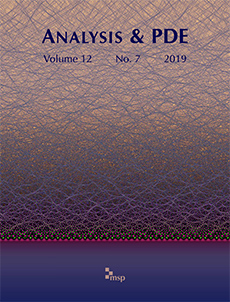Abstract
We study a system of two coupled nonlinear parabolic equations. It constitutes a variant of the Keller–Segel model for chemotaxis; i.e., it models the behavior of a population of bacteria that interact by means of a signaling substance. We assume an external confinement for the bacteria and a nonlinear dependency of the chemotactic drift on the signaling substance concentration.
We perform an analysis of existence and long-time behavior of solutions based on the underlying gradient flow structure of the system. The result is that, for a wide class of initial conditions, weak solutions exist globally in time and converge exponentially fast to the unique stationary state under suitable assumptions on the convexity of the confinement and the strength of the coupling.
Citation
Jonathan Zinsl. Daniel Matthes. "Exponential convergence to equilibrium in a coupled gradient flow system modeling chemotaxis." Anal. PDE 8 (2) 425 - 466, 2015. https://doi.org/10.2140/apde.2015.8.425
Information





